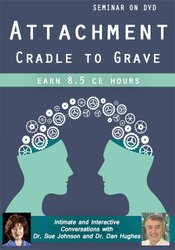Description
Join attachment experts, Dr. Sue Johnson and Dr. Dan Hughes, and be captivated by the influence of attachment from cradle to grave.
Attachment provides clinicians with a secure base to stand on, to see what is going on, and to systematically target those aspects to help your client. By using Emotionally Focused Couple Therapy, you will understand the framework of attachment and how to create a secure emotional connection between couples. You will also learn how to apply the theoretical model of Dyadic Developmental Psychotherapy in your daily practice, in order to support children and their families grow within their relationships.
In this six-session recording, Dr. Sue Johnson, developer of Emotionally Focused Therapy (EFT), and Dr. Dan Hughes, founder and developer of Dyadic Developmental Psychotherapy (DDP), describe the great impact of attachment and how EFT and DDP can reveal the elements of attachment.
Through intimate and interactive conversations, watch both Dr. Sue Johnson and Dr. Dan Hughes as they take you, step-by-step, through the models that could help your client create healthy and secure attachments.
CPD
CPD
This online program is worth 8.75 hours CPD.
Speaker
Dr. Sue Johnson was an author, clinical psychologist, researcher, professor, popular presenter and speaker and a leading innovator in the field of couple therapy and adult attachment. Sue was the primary developer of Emotionally Focused Therapy (EFT), which has demonstrated its effectiveness in over 30 years of peer-reviewed clinical research.
The founding director of the International Centre for Excellence in Emotionally Focused Therapy (ICEEFT), Dr. Johnson authored numerous books and articles including Attachment Theory in Practice: EFT with Individuals, Couples and Families (2019), The Practice of Emotionally Focused Couple Therapy: Creating Connection (3rd edition, 2019), and A Primer for Emotionally Focused Individual Therapy (EFIT) (2021).
Sue trained behavioral health providers in EFT worldwide and consulted to the over 75 international institutes and affiliated centers who practice EFT, including Veterans Affairs and the US and Canadian militaries. She was a Distinguished Research Professor at Alliant University in San Diego, a Professor, Clinical Psychiatry at the University of British Columbia, Canada, and a Professor Emeritus, Clinical Psychology, at the University of Ottawa, Canada.
Speaker Disclosures:
Financial: Dr. Sue Johnson had employment relationships with University of British Columbia, Campbell & Fairweather Psychology Group, Alliant International, University Ottawa, Couple and Family Institute, and the International Center for Excellence in Emotionally Focused Therapy. She received royalties as a published author. Dr. Johnson received a speaking honorarium, recording royalties, and book royalties from PESI, Inc. She had no relevant financial relationships with ineligible organizations.
Non-financial: Dr. Sue Johnson served on the editorial board for the American Journal of Family Therapy (AJFT) and the journal Couple and Family Psychology: Research & Practice.
Dan Hughes, PhD, is a clinical psychologist who founded and developed Dyadic Developmental Psychotherapy (DDP), the treatment of children who have experienced relational trauma within their family and demonstrate ongoing problems related to attachment and trauma. This treatment occurs in a family setting and the treatment model has expanded to become a general model of family treatment. Dan presents and trains in DDP internationally. He is also engaged in extensive training and supervision in the certification of therapists in his treatment model, along with ongoing consultation to various agencies and professionals. Information about DDPI can be found on ddpnetwork.org
Dan is the author of many books and articles. These include Building the Bonds of Attachment, 3rd Edition (Rown-Littlefield, 2017) and The Neurobiology of Attachment-Focused Therapy, with Jon Baylin, (W.W. Norton, 2016). His most recent books are Healing Relational Trauma with Attachment-Focused Interventions: Dyadic Developmental Psychotherapy with Children and Families, with Kim Golding and Julie Hudson as co-authors (WW. Norton, 2019), as well as The Little Book of Attachment with Ben Gurney-Smith (W.W. Norton, 2020).
Dan resides in South Portland, Maine.
Speaker Disclosures:
Financial: Daniel Hughes maintains a private practice. He receives royalties as an author for multiple publishers. Dr. Hughes receives a speaking honorarium and recording royalties from PESI, Inc. He has no relevant financial relationships with ineligible organizations.
Non-financial: Daniel Hughes is a member of the American Psychological Association.
Objectives
- Describe the symptoms, causes and effects of secure and insecure attachment, and its clinical implications.
- Summarize strategies to help reinforce safety in clients to improve clinical outcomes.
- Identify the three components of intersubjectivity and their treatment implications.
- Describe the PACE method and how it is used in the treatment of traumatized or attachment disordered youth.
- Articulate how the stages, steps and interventions of EFT can help improve clinical outcomes.
- Summarize therapeutic communication strategies to help reinforce bonding strategies in clients.
- Articulate the implications of the client’s emotional response in the therapeutic setting
- Summarize how the theory of attachment relates to understanding developmental trauma.
- Summarize the clinical implications of EFT in the context of relationships.
Outline
- Session 1-The Framework of EFT and Attachment - Part 1
- Understanding the Logic Behind Love
- The “EFT Tango”
- Designed for Love
- Couples Therapy: A New Era
- The Importance of a Secure Emotional Connection
- Using EFT to Understand the Nature of Relationships
- A New Science of Love
- Session 2-The Framework of EFT and Attachment - Part 2
- Changing the Responsiveness to Threat with EFT
- EFT is Experiential
- Primary Affect - Exploring Pivotal Moments
- The 6 Core Emotions
- Working within the Emotion and Affect Regulation
- EFT Core Assumptions
- Code of Attachment - Primary Needs
- Attachment Theory - Map of the Landscape of Love
- EFT Stages & Steps
- Session 3-Dyadic Development Psychotherapy - Part 1
- Attunement & Rhythmic Expression
- The Importance of Intersubjectivity
- Using Curiosity to Develop a Perception
- Using Attachment to Understand Developmental Trauma
- Research Supporting Attachment
- Self-Regulation - For the Therapist and for the Child
- Discipline in Secure Attachments vs. Insecure Attachments
- 3 Major Relational Systems in Mammals
- Session 4-Dyadic Development Psychotherapy - Part 2
- Speaking for the Child: Verbal and Non-Verbal Responses
- Using PACE to Stay Open
- PACE
- Playful
- Accepting
- Curious
- Empathetic
- First Panel Discussion with Dr. Sue Johnson and Dr. Dan Hughes
- How does EFT work with issues of rigid gender views, or a controlling dynamic?
- Creating Safety with Couples
- Creating Safety with Children
- What strategy does the therapist use to recognize their emotional response?
- How do you deal with dissociation in children?
- Session 5-Applying EFT within an Attachment Framework
- The “Still Face Experiment”
- How Couples React to Emotional Disconnection
- EFT Stage1: De-escalation
- EFT Stage 2: Restructuring the Bond
- EFT Stage 3: Consolidation
- Interventions in EFT Through Reflection
- The Importance of Validation in Creating Safety
- We are Designed to Co-Regulate with Other People
- Evocative Responding - Process Enquiries
- Heightening, Expanding Awareness
- Session 6-Dyadic Development Psychotherapy - Part 3
- Attachment is Reciprocal
- Using a Storytelling Rhythm to Engage Children with an Affective/Reflective Component
- Working with the Parents Before the Session
- Understanding the Situation, Bringing the Child In
- Protecting the Dialogue
- Continuing the Rhythm through the Hard Parts
- No Distinction Between Directive and Non-Directive Therapy
- Connect - Break - Repair
- Non-Verbal Communication
- Starting Experiential then Moving into Reflection
- Dialogue on Treatment Models with Dr. Sue Johnson and Dr. Dan Hughes
- Dr. Sue: On Leading People into their Story, and Making Sense of it
- Dr. Dan: On Validating Both Parties on Having Confidence to go to the Heart of the Matter
- Dr. Sue: On Asking “Why”
- Dr. Dan: Why he Uses “Why” (within the Context of PACE)
- Dr. Sue: Validating the Positive within an Attachment Framework
- Dr. Dan: The Validation isn’t just Observational, but Experiential
- Dr. Sue: Both Practices Involve Emotional Presence with the Clients
- Dr. Sue: Intersubjective Mean both People Are Affected
- How do you deal with a parent of teen who puts up a wall?
- Dr. Sue: Take Care of the Relationship - The Bond - and the Content will Take Care of Itself
- Second Panel Discussion with Dr. Sue Johnson and Dr. Dan Hughes
- How do you work with people where there is basic trust lacking?
- How do you work with biological parents who may have caused the trauma?
- Interventions take time, how do you manage the pressure to fix things quickly?
- How do you deal with labels or diagnoses?
- Can you give an example of a disruption or break in connection? What were your repair strategies?
Target Audience
Psychologists, Counselors, Social Workers, Case Managers, Addiction Counselors, Marriage & Family Therapists, Nurses, and other Mental Health Professionals.
Reviews
Overall:
4.6
Total Reviews: 14


 Online CourseFrank Anderson’s Master Class in Internal Family Systems Therapy£129.98£999.98Frank Anderson’s Master Class in Internal Family Systems Therapy29 Jan, 2024Frank Anderson’s Master Class in Internal Family Systems Therapy£129.98£999.98 value
Online CourseFrank Anderson’s Master Class in Internal Family Systems Therapy£129.98£999.98Frank Anderson’s Master Class in Internal Family Systems Therapy29 Jan, 2024Frank Anderson’s Master Class in Internal Family Systems Therapy£129.98£999.98 value Online CourseDr Laurel Parnell’s Attachment-Focused EMDR Skills and Supervision Group£495.00£1,590.00Dr Laurel Parnell’s Attachment-Focused EMDR Skills and Supervision Group14 Jan, 2025Dr Laurel Parnell’s Attachment-Focused EMDR Skills and Supervision Group£495.00£1,590.00 value
Online CourseDr Laurel Parnell’s Attachment-Focused EMDR Skills and Supervision Group£495.00£1,590.00Dr Laurel Parnell’s Attachment-Focused EMDR Skills and Supervision Group14 Jan, 2025Dr Laurel Parnell’s Attachment-Focused EMDR Skills and Supervision Group£495.00£1,590.00 value BookWritten by three leading experts in the fields of disordered eating, mental health, and trauma-informed care, this book will become your go-to guide for learning how to reject diet culture, heal your£18.99Written by three leading experts in the fields of disordered eating, mental health, and trauma-informed care, this book will become your go-to guide for learning how to reject diet culture, heal your20 Feb, 2024Written by three leading experts in the fields of disordered eating, mental health, and trauma-informed care, this book will become your go-to guide for learning how to reject diet culture, heal your£18.99
BookWritten by three leading experts in the fields of disordered eating, mental health, and trauma-informed care, this book will become your go-to guide for learning how to reject diet culture, heal your£18.99Written by three leading experts in the fields of disordered eating, mental health, and trauma-informed care, this book will become your go-to guide for learning how to reject diet culture, heal your20 Feb, 2024Written by three leading experts in the fields of disordered eating, mental health, and trauma-informed care, this book will become your go-to guide for learning how to reject diet culture, heal your£18.99 Online CourseCBT-I To Treat Insomnia: Proven Interventions That Go Beyond Sleep Hygiene£0.00£149.00CBT-I To Treat Insomnia: Proven Interventions That Go Beyond Sleep Hygiene12 Dec, 2024CBT-I To Treat Insomnia: Proven Interventions That Go Beyond Sleep Hygiene£0.00£149.00 value
Online CourseCBT-I To Treat Insomnia: Proven Interventions That Go Beyond Sleep Hygiene£0.00£149.00CBT-I To Treat Insomnia: Proven Interventions That Go Beyond Sleep Hygiene12 Dec, 2024CBT-I To Treat Insomnia: Proven Interventions That Go Beyond Sleep Hygiene£0.00£149.00 value














